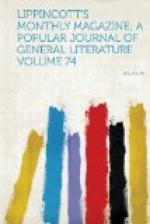Many of the crofters belong to families which have lived on the same holdings for generations. It is a common experience everywhere that long-continued use begets and fosters the feeling of ownership. This is especially true when, as in the crofter’s case, there is so much in the history and traditions of the people and the property that tends to establish a right of possession. Besides, the crofter, or one of his ancestors, has in most cases built the house and made other improvements: sometimes he has reclaimed the land itself and changed a barren waste into a garden. The labor and money which he and his ancestors have expended in improving the place seem to him to give him an additional right to occupy it always. It is his holding and his home, the home of his fathers and of his family. While he may be unable to resist the power of his landlord, and may have no legal security for his rights and interests, he regards the curtailment of his privileges or the increase of his rent as unjust, and eviction as a terrible outrage. “The extermination of the Highlanders,” says one of their kinsmen, “has been carried on for many years as systematically and persistently as that of the North-American Indians.... Who can withhold sympathy as whole families have turned to take a last look at the heavens red with their burning homes? The poor people shed no tears, for there was in their hearts that which stifled such signs of emotion: they were absorbed in despair. They were forced away from that which was dear to their hearts, and their patriotism was treated with contemptuous mockery.... There are various ways in which the crime of murder is perpetrated. There are killings which are effected by the unjust and cruel denying of lands to our fellow-creatures to enable them to obtain food and raiment.”
The feeling of the crofters in regard to increase of rent and eviction is very similar to that of the Irish tenantry. Very recently Mr. Parnell uttered sentiments which both would accept as their own. “I trust,” he said, “that when any individual feels disposed to violate the divine commandment by taking, under such circumstances, that which does not belong to him, he will feel within him the promptings of patriotism and religion, and that he will turn away from the temptation. Let him remember that he is doing a great injustice to his country and his class,—that though he may perhaps benefit materially for a while, yet that ill-gotten gains will not prosper.” Where crofters have been evicted, or have had their privileges curtailed or their rent raised, they and their descendants do not soon forget the grievance. Claims have recently been made for lands which the crofters have not occupied for two or three generations.




